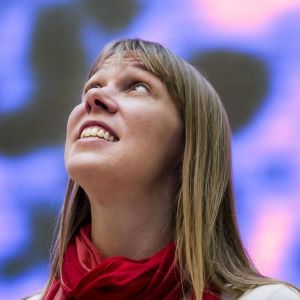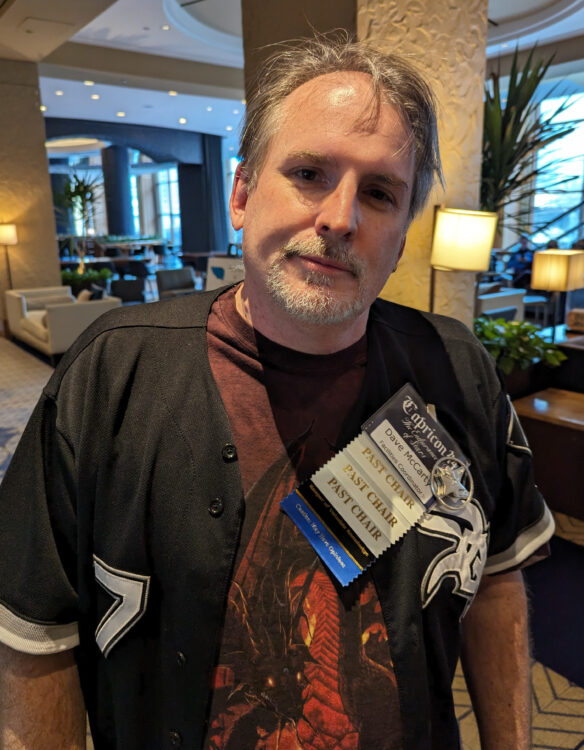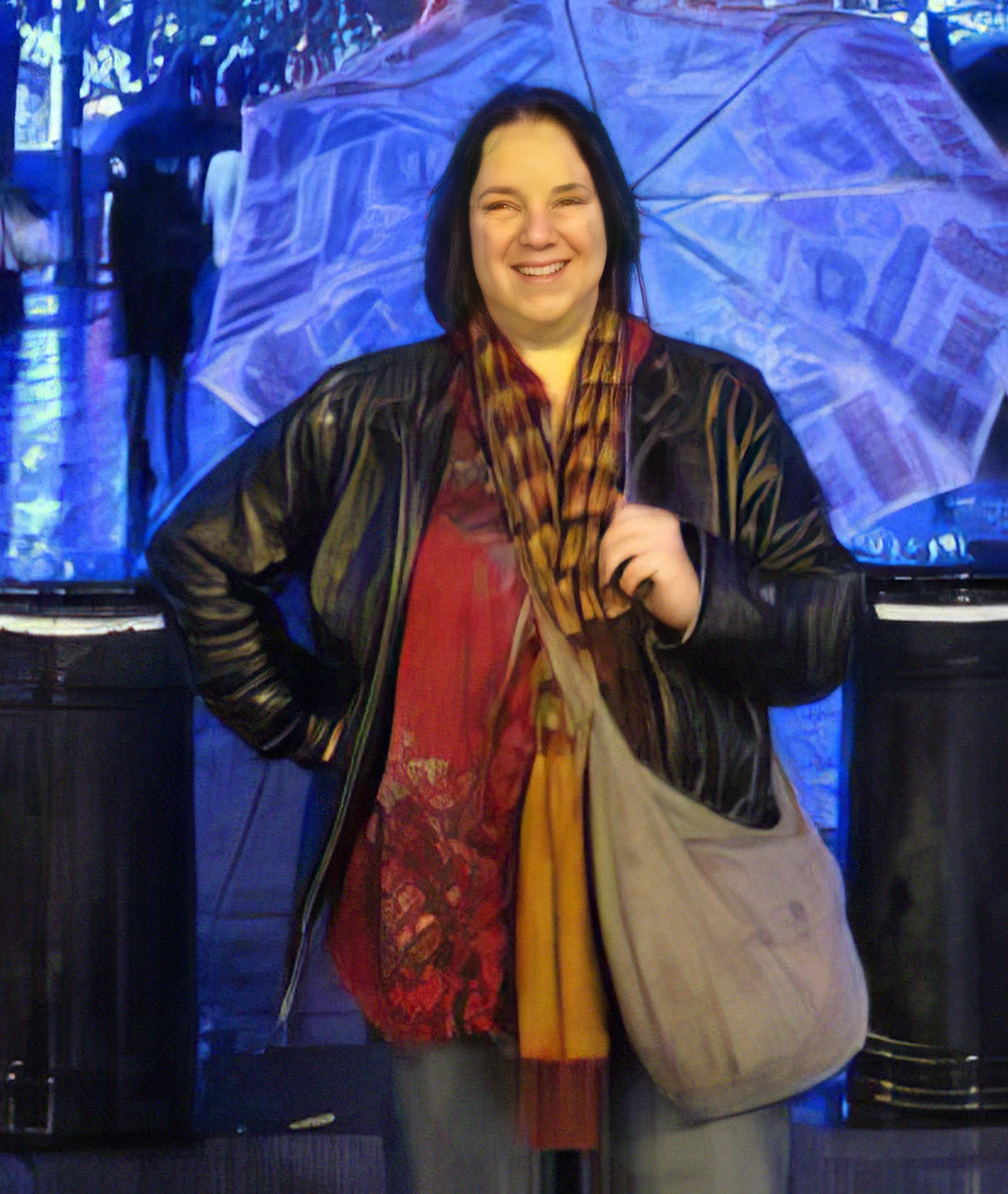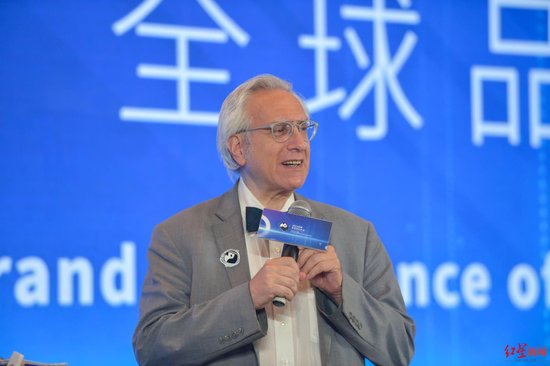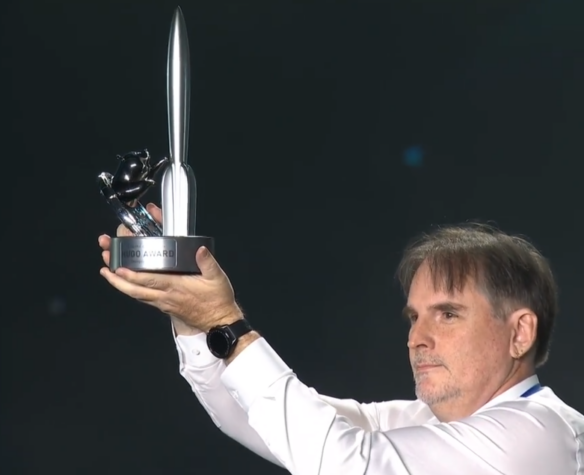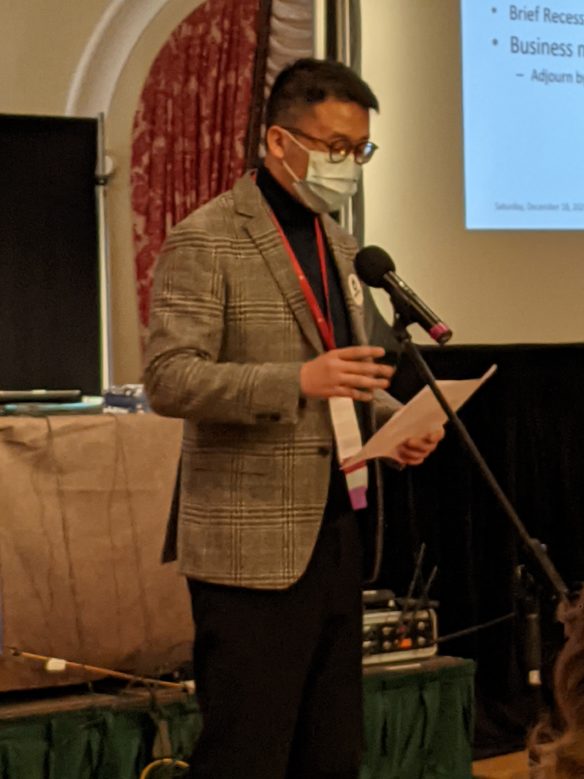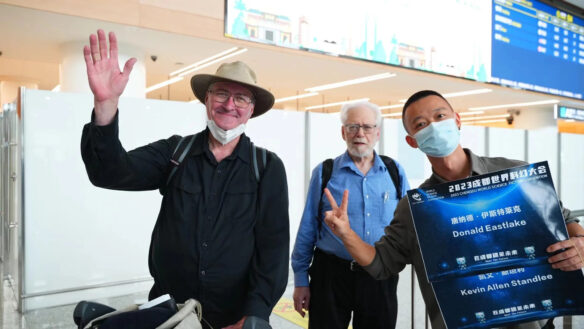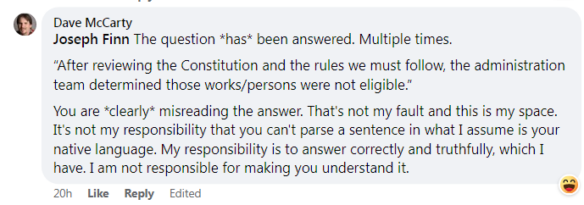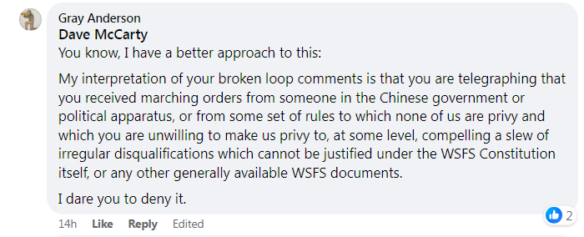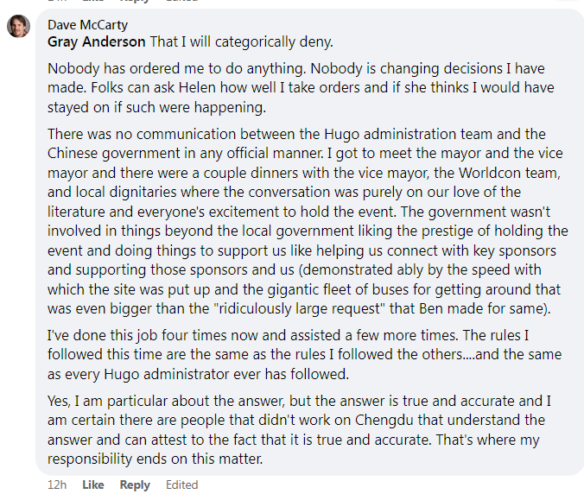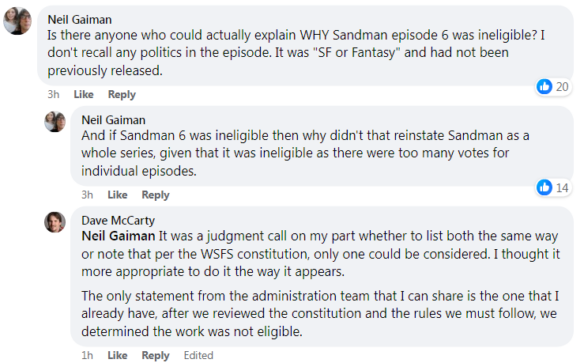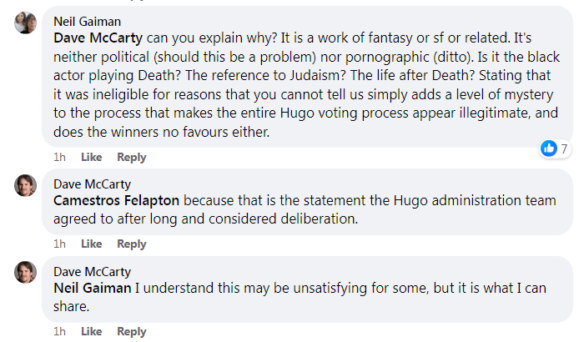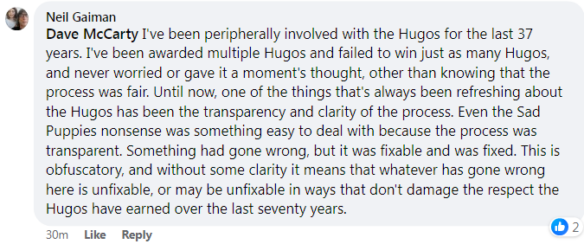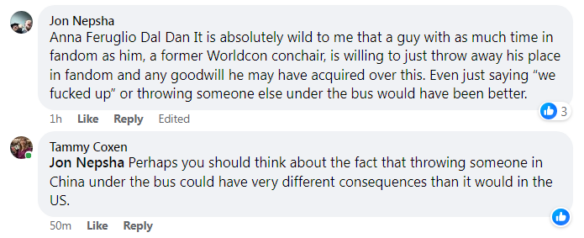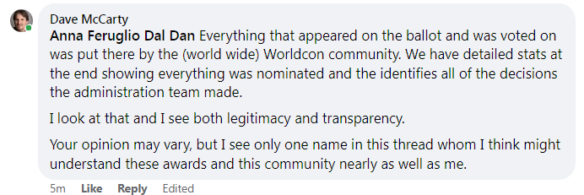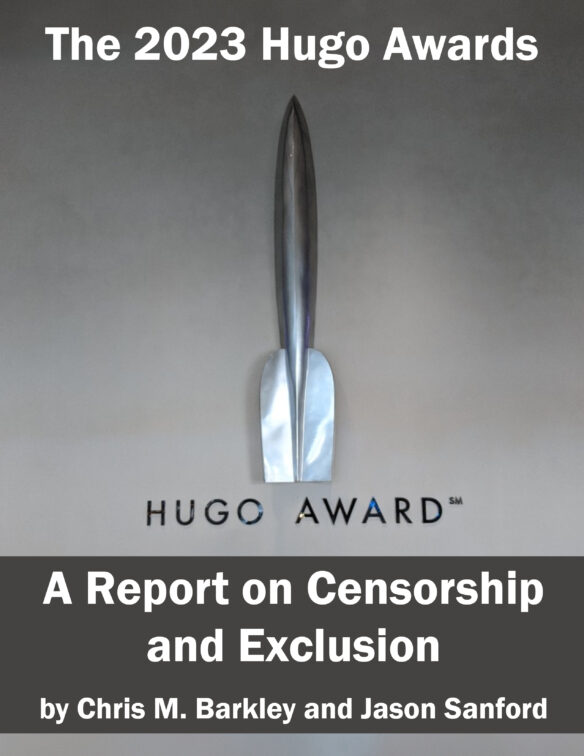
This report is being released simultaneously on File770 and Genre Grapevine and is also available to download as an e-book epub file and as a PDF.
By Chris M. Barkley and Jason Sanford
“You acquire information and you convey the information. That’s the job.”
++ National Public Radio News Director, Editor and Reporter Emeritus Linda Wertheimer, February 7, 2024
INTRODUCTION
By Chris M. Barkley: The earliest documentation of the phrase, “News is only the first rough draft of history,” is attributed to a 1943 New Republic book review written by Alan Barth. The phrase quickly caught on with other writers and journalists at the time and for many decades, the late Washington Post president and publisher Philip L. Graham was wrongly given credit for the phrase.
For journalists, such as myself for example, the phrase rings true on a very basic and emotional level. And while what you are about to read here will be considered shocking and a seismic event in the history of SF fandom and the World Science Fiction Society in particular, it is my hope that it is just the beginning of a greater story yet to be told.
What my colleague and co-author Jason Sanford and I are going to outline in this lengthy report will most certainly not be the final word on the extraordinary events and actions surrounding the 2023 Hugo Awards that were adjudicated and presented by the 81st World Science Fiction Convention held in the city of Chengdu in China in October of 2023.
To understand how extraordinary these events were, I refer back to the 79th Worldcon held in Washington D.C. in December of 2021; a bid from fans based in The People’s Republic of China won the bid for the 81st Worldcon over the bid from Winnipeg, Manitoba Canada by a wide margin.
This in itself was not unusual, except that there was a considerable amount of consternation on the method and accounting of the Chinese ballots. A majority of the ballots from China had email addresses and not the traditional street addresses that fans in other parts of the world usually provide.
The DisCon III committee allowed the contested votes and the Chengdu bid was declared the winner.
Almost immediately there were signs that the Chengdu convention committee may not have expected to win; the one-sheet announcement had no guests of honor, hotel information or membership rates listed. Most alarmingly, several vital convention committee spots were either vacant or non-existent.
In the intervening twenty-one months, there were long periods of silence from the concom, which caused a great deal of concern among many SF fans and convention organizers as well.
This period was followed up by a frenzy of activity. First came the announcement of the author Guests of Honor, the Hugo Award winning novelists Liu Cixin from China and Canadian Robert J. Sawyer and Russian SF author Sergey Lukianenko.
Lukianenko, who was mostly unknown to readers and fans in the West, turned out to be an ardent supporter of Russian dictator Vladimir Putin and subsequently made inflammatory comments about his support for the unprovoked war against Ukraine, which began in February of 2022.
In addition, the Chengdu Worldcon was heavily criticized because it was being held under the auspices of an authoritarian regime which regularly spied on, discriminated against or jailed political dissenters, religious minorities, writers, artists, booksellers and publishers. There were also allegations that the government was colluding with business interests to build the venue the convention would be held in. The delays in the construction of the facility moved the date of the start of the Worldcon from early August to mid-October.
But, against all odds, the Chengdu Worldcon was staged successfully and was widely acclaimed by all those who attended, including myself.
I was invited by the Worldcon Convention Committee and its hosting organization, the Chengdu Science Fiction Society as a finalist in the Best Fan Writer category. (Full Disclosure: My airfare, lodgings and meals were paid for by the convention. I gave no considerations to the Worldcon in return for my attendance).
The Science Fiction Museum turned out to be a fabulous site for the proceedings, the panels were well attended, presentation areas were spectacular and the Hugo Awards Ceremony came off without a hitch.
But, having attended thirty-one previous Worldcons, there is no such thing as a convention without some problems or complications; the main one was that I heard first hand of complaints by attendees that there were a limited number of tickets for the main events, the opening ceremonies, the Hugo Awards ceremony and closing ceremonies.
The only curious thing I noticed was that the long list of nominations and the voting results, which are usually out soon after the ceremony, were not released. In fact, that was still the case by the time I left China, which was two days later.
The final voting results were finally published on December 3, 2023, forty-six days after the end of the Chengdu Worldcon. There was no explanation for the delay.
And on January 20th, ninety-one days from the opening of the convention, the Long List of nominees was published on TheHugoAwards.org.
There was a firestorm of outrage, condemnation, speculation and rumors of malfeasance surrounding the absence of the works of novelist R.F. Kuang (Babel), screenwriter and producer Neil Gaiman (The Sandman), fan writer Paul Weimer, and Xiran Jay Zhao — who would have been an Astounding Award nominee for Best New Writer — despite having enough nominations to make the Final Ballot.
At the time of its release, no further explanation was given by the Chengdu Worldcon Convention Committee or Hugo Award Administrators, other than the works in question were ruled not eligible.
Both Jason and I have taken care to diligently gather evidence to answer the following questions:
- Who was responsible for the “not eligible” rulings?
- Was there evidence to support marking these particular works “not eligible”?
- Why were these particular works chosen?
- To what extent was the Chinese Communist Party and business interests involved?
- What measures should be taken to ensure that the disenfranchisement of future nominees is never repeated?
This report, prepared by myself and Jason Sanford, is not meant to be the final word on what happened at this Worldcon. We are hoping that others, both here and abroad, will follow in our journalistic footsteps and come forward with more information and details about these events.
We hope that this is not the last inquiry into the curious, shocking and ultimately devastating story that we hope will bring about changes in how Worldcons are run and how the Hugo Awards are administered. We also acknowledge that this report will be quite upsetting to the fannish community but we hope that exposing the truth will also lead to the first steps in healing these social and political wounds ailing us.
As journalists, we are dedicated to be fair, accurate, and equitable in our pursuit of the truth. We are lucky that we live in an open society where inquiries like this are not only legal, but possible.
Jason, I, and other dedicated journalists like the recently retired Linda Wertheimer (whom I quoted above) know that we carry a sacred responsibility to get it right and convey it directly to you, factually and without bias.
++ Chris M. Barkley — 14 February 2024
LEAKED EMAILS AND FILES REVEAL POLITICAL CONCERNS RESULTED IN INELIGIBILITY ISSUES WITH 2023 HUGO AWARDS
By Chris M. Barkley and Jason Sanford: Emails and files released by one of the administrators of the 2023 Hugo Awards indicate that authors and works deemed “not eligible” for the awards were removed due to political considerations. In particular, administrators of the awards from the United States and Canada researched political concerns related to Hugo-eligible authors and works and discussed removing certain ones from the ballot for those reasons, revealing they were active participants in the censorship that took place.
When the Hugo Award voting and nomination statistics were released, no detailed explanation was given for why multiple authors and works were deemed “not eligible” even though they had enough nominations to make the award’s final ballot. The only official explanation came from overall Hugo Awards administrator Dave McCarty, who said “After reviewing the Constitution and the rules we must follow, the administration team determined those works/persons were not eligible.”
However, emails and files released by another member of that Hugo administration team, Diane Lacey, shows that the rules “we must follow” were in relation to Chinese laws related to content and censorship.
Lacey previously served as an administrator for the Hugo Awards in 2009, 2011, and 2016, and was the lead Hugo administrator for Chicon 7 in 2012. The 2023 Hugo Award Administration Team for the 81st World Science Fiction Convention in Chengdu were comprised of the following people according to the official Hugo Awards website: Dave McCarty, Ben Yalow, Ann Marie Rudolph, Diane Lacey, Shi Chen, Joe Yao, Tina Wang, Dongsheng Guo, and Bo Pang.
While the official Hugo Awards website doesn’t list Kat Jones as an administrator, the emails Lacey shared show Jones was involved in working on the awards. Lacey also confirmed this in an interview, as did Jones who said in an email exchange that “I did a small amount of work in the margins of the 2023 Hugo process, but was nowhere near any decisions.”
In an apology letter released to this report’s authors, Diane Lacey wrote “Let me start by saying that I am NOT making excuses, there are no adequate excuses. I am thoroughly ashamed of my part in this debacle, and I will likely never forgive myself. But the fans that have supported the Hugos, the nominees, and those that were unfairly and erroneously deemed ineligible in particular, deserve an explanation. Perhaps the only way I can even begin to ease my conscience is to provide one.”
The emails Lacey shared are extremely illuminating about the entire controversy. In an email from Dave McCarty dated June 5, 2023, he announced to the Hugo Award administration group that “This is us, the group of folks that are validating the Hugo finalists.”
None of the Chinese members of the administration team were listed as recipients in any of the emails examined for this report, only administrators who were from Western countries.
After discussing technical details of the work in the June 5th email, McCarty wrote “In addition to the regular technical review, as we are happening in China and the *laws* we operate under are different…we need to highlight anything of a sensitive political nature in the work. It’s not necessary to read everything, but if the work focuses on China, taiwan, tibet, or other topics that may be an issue *in* China…that needs to be highlighted so that we can determine if it is safe to put it on the ballot (or) if the law will require us to make an administrative decision about it.”
On June 5, Kat Jones asked McCarty for a “list or a resource you can point us to that elaborates on ‘other topics that may be an issue *in* China’?”
McCarty responded on June 5 at 7:18 pm saying “At the moment, the best guidance I have is ‘mentions of Hong Kong, Taiwan, Tibet, negatives of China’. I will try to get better guidance when I have a chance to dig into this deeper with the Chinese folks on the committee.”
On June 6, Kat Jones wrote an email to the administration group titled “Best Novel potential issues.” In the email, Jones raised concerns about the novels Babel, or the Necessity of Violence by R. F. Kuang and The Daughter of Doctor Moreau by Silvia Moreno-Garcia. Jones wrote that Babel “has a lot about China. I haven’t read it, and am not up on Chinese politics, so cannot say whether it would be viewed as ‘negatives of China’” while adding that The Daughter of Doctor Moreau talked “about importing hacienda workers from China. I have not read the book, and do not know whether this would be considered ‘negative.’”
Babel, which won the Nebula Award for Best Novel, ended up being deemed “not eligible” for the Hugo Awards despite having 810 nominations, more than enough to make the final ballot. The Daughter of Doctor Moreau was not removed from the ballot.
When the authors of this report reached out to Kuang for comment, her publicist said by email that due to her academic schedule and writing deadlines Kuang was unavailable for an interview.
In addition to being involved in work on last year’s Hugos, Kat Jones is the current overall Hugo Awards administrator for the 2024 Worldcon in Glasgow, Scotland.
In an emailed statement in response to a request for comment, Jones said she was concerned that the “confidential Hugo Award eligibility research work product that was ‘leaked’” may be incomplete or modified, and that she was “shocked that this extremely extremely confidential material was shared in the first place.”
“In relation to my involvement with Chengdu,” she added, “as the previous Hugo administrator from Chicon8, there is a necessary handover aspect from administrator-to-administrator. Then in addition, at the request of the Chengdu team I assisted with eligibility research for some of the English language works/creators in June 2023. I performed some of the 2023 Hugo Awards eligibility research on some of the English-language potential finalists. …
“For Chengdu, I conducted the eligibility research as instructed by the 2023 Hugo Award Administrator, and asked for clarifications where instructions were not clear. I did have concerns, and I shared them with the Administrator. Those concerns you should have evidence of if you have access to all communications. I was not involved in the evaluation of the data we flagged – and you’ll note in those emails we all expressed confusion over the vague instructions and had no idea whether anything we were mentioning was an actual problem. I had serious concerns at this point about this process. I then stepped back and did no further work for the Chengdu Worldcon after the first pass of eligibility research. I only had visibility into that first step as a Hugo researcher. I did not ever and do not have visibility into why the choices that were made, were made.”
At the end of her statement, Jones said “I would not be willing to participate in any way in the administration of an award under such circumstances again. I don’t think we, as a community, should put our Hugo Award administration teams in this kind of no-win situation. The safety, wellbeing, and freedom of our community members is a whole different kind of consideration.”
The entire statement from Jones can be downloaded here.
The American and Canadian Hugo Award administrators also examined political concerns around the finalists for the Astounding Award for Best New Writer. In an email dated June 7, 2023, Lacey raised possible issues with regards to Xiran Jay Zhao, Naseem Jamnia and Sue Lynn Tan. Xiran Jay Zhao ended up being deemed “not eligible” despite being a finalist in that same category the year before. Naseem Jamnia made the final ballot while Tan appears to have not had enough nominations to make the final ballot.
The Hugo Awards category that received the most concerns in the email chain was Best Fan Writer. As Kat Jones wrote in an email dated June 7, 2023, “This category has the potential to be problematic, under the constraints you’ve listed, for most non-Chinese fan writers.” Jones then detailed items of possible concern for numerous fan writers including the two authors of this report along with Paul Weimer, Bitter Karella and several writers who subsequently did not receive enough nominations to qualify for the 2023 final ballot such as Alex Brown (a 2022 Hugo finalist in this category), Camestros Felapton (a 2018 Hugo finalist) and Alasdair Stuart (a three-time Hugo finalist).
Paul Weimer would eventually be deemed “not eligible” for the award despite meeting eligibility requirements in the constitution of the World Science Fiction Society, which lists the rules governing the Hugo Awards. Among the concerns Jones raised about Weimer’s writings were him having traveled to Tibet, him having a Twitter discussion with Jeannette Ng about Hong Kong along with mentioning Hong Kong and Tiananmen Square on that social media platform, expressing support for the Chengdu Worldcon while also sharing negatives about the Chinese government in a Patreon article, and writing a review of S.L. Huang’s The Water Outlaws where Jones said Weimer praises Huang for “tak[ing] one of the pillars of Chinese literature and reinvent[ing] it as a queer, feminist retelling of an important and nation-defining story.”
It should be noted that Mr. Weimer was nominated for the Hugo Award as fan writer on the 2020-2022 Hugo Award final ballots and last year for Best Fanzine as one of the editors of Nerds of a Feather.
In an interview on February 11, 2024, Weimer said he only found out he was declared “not eligible” for the Hugo Award for Best Fan Writer when the complete Hugo nomination and voting statistics were released. He confirmed he was eligible for the Best Fan Writer Award by virtue of publishing more than 60 works in various places.
“I had more ‘fan writer’ somethings than you can shake a stick at … by any definition of the word,” he said.
Weimer also confirmed that, despite the research done on him by the Hugo administrators, he has never visited Tibet. Instead, he had previously traveled to Nepal and Vietnam.
When told about the political research the Hugo administrators did on him, Weimer’s initial response was very pointed: “Well fuck,” he said, noting that he doesn’t curse that often but a precision f-bomb seemed appropriate here.
“I was afraid that in the end this was going to come down to soft or hard or some kind of censorship once things started leaking out,” Weimer said. “I mean, they came up with a dossier on all of us and went through stuff from 10 years ago? I mean, I honestly think that the Hugo committee are cowards. I would like to hope that if I was in the position of Dave McCarty and the others I’d have simply said we can’t hold the awards under these conditions and just cancel the fucking things rather than going through political dossiers. This is the worst possible outcome.”
Strangely, neither the emails nor other supporting files shared with the authors explain why the episode “The Sound of Her Wings” from Neil Gaiman’s The Sandman TV series was ruled ineligible. When asked about this, Diane Lacey said she wasn’t sure who reviewed finalists for the Hugo Award for Best Dramatic Presentation but it wasn’t her, Kat Jones or any other associate administrators.
At the time of publication, Gaiman has not responded to a request for an interview. A request for comment with Xiran Jay Zhao is also still pending.
The emails provided by Diane Lacey can be downloaded here.All emails examined by the authors are included in that document. Personal email addresses of the people on the Hugo Award administration team have been redacted. In addition, the name of one Hugo administrator who was cc’d on the shared emails but didn’t respond to any of the emails was redacted. Otherwise the emails haven’t been altered or edited in any way. The authors of this report initially received these emails in a printed format. Some of the emails in the combined PDF are from a scanned version of the print copies.
In addition to the emails, Lacey also shared other supporting documents, including a “validation” spreadsheet where comments were shared by the Western Hugo administrators about different Hugo finalists and potential finalists. Comments on the finalists ranged from “possible issues” to “minor possible issues” to “no issues.”
One interesting aspect of the “validation” spreadsheet is it appears to show a number of Chinese works that may have been removed from the final ballot. For example, in the Best Novel category, four Chinese novels are listed including We Live in Nanjing by Tianrui Shuofu. None of these novels made the final ballot.
In both Diane Lacey’s apology letter and an interview, she said some of these Chinese works were removed due to “collusion in a Chinese publication that had published a nominations list, a slate as it were, and so those ballots were identified and eliminated.”
However, the Hugo administrators from the United States and Canada appear to have only examined works and authors who were from the Western world and who mainly published in English. The “validation” spreadsheet shows that the Western administrators did not raise concerns about any of the Chinese authors or works on that spreadsheet, only about Western-based authors and works originally published in English.
Because of this, it is possible some of these Chinese works were removed for other reasons than slating.
While the emails from the Hugo administrators don’t reference overall Hugo Awards committee decisions or any specific orders from the Chinese government, a post reported to be from a Sichuan government website discusses work done to censor works related to last year’s Worldcon.
In the post, the Propaganda Department of the Sichuan Provincial Committee of the Communist Party of China stated that “Three special groups reviewed the content of 1,512 works in five categories, including cultural and creative, literary, and artistic, that were shortlisted in the preliminary examination of the Chengdu World Science Fiction Convention, conducting strict checks on works suspected of being related to politics and ethnicity and religion, and putting forward proposals for the disposal of 12 controversial works related to LGBT issues.”
The post was later deleted.
Because the post was deleted, it is difficult to prove its authenticity. However, the post does tie in with language from the Chengdu Worldcon’s second progress report that was shared by ErsatzCulture on X-Twitter on January 20 and by Nibedita Sen on Bluesky on January 23. That language stated “Eligible members vote according to the ‘one person, one vote’ rule to select Hugo Award works and individuals that comply with local laws and regulations.” [emphasis added]
It’s also possible self-censorship was undertaken due to fears of what might happen if certain finalists made the final ballot, or due to pressure from financial interests and businesses in China not wanting to upset a major investment opportunity. As reported by China.org.cn, “Investment deals valued at approximately $1.09 billion were signed during the 81st World Science Fiction Convention (Worldcon) held in Chengdu.”
As Lacey said in an interview, “The things that were marked ineligible, was it local pressure from the government or was it business interests? I can’t answer that. From my knowledge, I would probably say business interests.”
In an interview conducted on February 4 in Chicago, Dave McCarty said that the Chinese government was not indirectly involved in the Hugo Awards “except insofar as the government says what the laws are in the country. … So the government of China says what’s cool in China and the people just operate inside of the bounds of what’s cool, which is exactly the same way that you and I work here.”
What McCarty appears to be referring to is self-censorship. As discussed in the academic article “The Cost of Humour: Political Satire on Social Media and Censorship in China,” there is a “red line” around certain forbidden topics in the country. Because people don’t know exactly what the red line is, and because the punishment for crossing the line can be so severe, “self-censorship is the only way to protect themselves and lower the risk.”
In recent years, this practice of self-censoring has spread to numerous Western organizations and groups that work in or have dealings with China, including Hollywood studios, technology companies, and Ivy-League schools.
Regardless of whether official government censorship took place or if it was self-censorship, what is certain is that the Hugo Award administrators from outside of China were actively involved in researching issues that enabled this censorship.
In an email dated June 7, 2023 at 6:18 PM and sent to the Western Hugo administrators, Dave McCarty said “Tomorrow I have a 4 hour meeting with my chinese counterpart to look at ballot detail and determine if any ballots are to be voided (which happens with frequency so that it’s not *really* that controversial if we determine we need to do it) as well as what things we need to move categories.” The identity of this Chinese counterpart remains unknown at this time.
McCarty then added “The chairs and the administrators will review the items we’ve highlighted in research Friday evening if we have enough time after the ballot review…otherwise we’ll be looking at it on Saturday (China time, of course, so we’re about 13 hours ahead of you).”
This statement, along with McCarty’s earlier email saying the administrators will “determine if it is safe” to put finalists on the ballot or “if the law will require us to make an administrative decision about it,” shows that the research the Western administrators did on Hugo Award finalists was used by the Chengdu convention chairs and administrators to determine who would be on the final ballot.
Lacey confirmed in an interview that this is what happened. “We were supposed to identify any issues and pass them on,” she said. “The decisions were above our heads.”
As Lacey explained in more detail in her apology letter, “We were told to vet nominees for work focusing on China, Taiwan, Tibet, or other topics that may be an issue in China and, to my shame, I did so. Understand that I signed up fully aware that there were going to be issues. I am not that naïve regarding the Chinese political system, but I wanted the Hugos to happen, and not have them completely crash and burn.”
Since the release of the Hugo Award nomination statistics on January 20, Western fandom has been outraged over what happened while multiple mainstream media outlets including The Guardian, Publishers Weekly, and Esquire have covered the story. In addition, there have been unverified reports of fans in China who are also angry at having their first Worldcon tainted by this affair.
In the initial week after the release of the statistics, multiple posts by Chinese fans were translated and shared in the Western world, such as a thread of comments in a Bluesky thread shared by Angie Wang. And Zimozi Natsuco, a genre fan from China, published an essay on File770 describing shock and anger at what happened while also giving a glimpse behind the scenes at what might have gone down.
However, in recent weeks posts like these from Chinese fans have been harder to find. According to a report by Ersatz Culture on File770 released on January 27 (see item #8 at link), posts related to the Hugo Awards controversy in China began disappearing around this time.
This report’s authors attempted to reach out to Chinese genre fans for comment, but did not receive any responses in time to include in this report.
An explanation for what might be happening came from Pablo Vazquez, a traveling genre fan and co-chair of the 12th North American Science Fiction Convention in San Juan, Puerto Rico. Vazquez is also well known for his connections with genre fans around the world.
When Vazquez was asked if he could help connect the authors with any fans in China who might comment for this report, he said “I’m sorry. They do not want to speak to the media even anonymously.”
As Vazquez stated in a follow-up comment, “I have a lot of love for Chinese fandom and my friendships and connections there run deep. That’s a real and vibrant fandom there that is, like us, wanting very little to do with their government being involved in their fandom. They definitely don’t think it’s their government and instead think its corporate interests or, even worse, a fan/pro organization. Honestly, they seem more scared by that than anything else which saddens me to see and despite multiple attempts to get them to share their story they seem really hesitant.”
He elaborated further: “They don’t seem to fear official reprisal (the CPC seems to want to find who’s responsible for embarrassing them on the world stage actually) but rather ostracization from their community or its outright destruction. If I were to hazard a guess, the way we blew up this affair in the international media has now put this fandom in very serious trouble. Previously, it was one of the few major avenues of free speech left in China. Now, after all this, the continuation of that freedom seems highly unlikely.”
In the days following the January 20th release of the nomination Long List, several forums have been created online and all of them are calling for the Hugo Awards to be separated from the control of the sitting Worldcon and amending the Constitution of the World Science Fiction Society (WSFS) to accomplish this.
In Dave McCarty’s February 4th interview, he said he was opposed to separating the Hugos from Worldcon, calling it “entirely wrong headed.”
“Even though I am certain that every administration decision I made was correct, I don’t think that anybody would ever give me this job again,” McCarty said in the interview. “The answers that I’ve got for the administration decisions, all I can say is again, after reviewing this Constitution and all the other rules we must follow, the administration team ruled that these works were ineligible, which absolutely, categorically is our right to do, you know, that’s right there in the WSFS Constitution.”
A full transcript of the File 770 interview with Dave McCarty can be found here.
When Paul Weimer was asked if he supported separating the Hugos from each local Worldcon, he said, “I was already moderately inclined toward that idea and now I’m more inclined. Clearly we need third-party auditing of the ballot and the whole process as a standard practice. Custom is not strong enough. Custom failed here. It wasn’t a failure in Chengdu, it was a failure here. We need guardrails of multiple types. Because otherwise people are going to stop trusting the Hugo results and that will be the death of the awards.”
OBSERVATIONS AND CONCLUSIONS
By Jason Sanford: In a recent article in Esquire about the Hugo Awards controversy, I talked about how the science fiction and fantasy genre saved my life. I still remember how as a kid certain SF/F novels and stories gave me an escape from horrific days while also opening my mind to new possibilities. These stories also revealed to me that other people saw the world in similar ways to myself.
All of this gave me the drive to not give up and to continue moving forward. And in a major way, I found the stories that illuminated and saved my life through the Hugo Awards. Back then I read every Hugo winner and finalist I could find. While I didn’t agree with or even like many of them, they were still the standard by which I approached the SF/F genre.
When I grew up and began writing my own SF/F stories, I realized the idealized version of the Hugos from my youth didn’t exist. The Hugo Awards, like all awards, were flawed. Some stories that deserved to be finalists never made the ballot. Other works that did likely shouldn’t have been there. And that’s before getting into the political infighting, lack of diversity, lack of inclusion, and other issues that have plagued the awards for decades.
No, the Hugo Awards aren’t perfect. However, what I still love about the Hugos is how they result from thousands of people across fandom working together to honor stories and authors. I love how readers continue to discover new authors and stories thanks to the words “Hugo Award finalist” or “Hugo Award winner.” I love seeing the excitement in an author’s face when they’re nominated for or win a Hugo.
I also respect how each problem that pops up with the awards is examined and dissected by the genre as a whole until maybe, eventually, possibly, a solution is found.
Now the Hugos are facing the biggest crisis in their history.
Make no mistake; the 2023 Hugo Awards were censored because certain authors and works were deemed to have too many political liabilities, at least from the viewpoint of the Chinese government. While it’s unclear if this was official censorship from the Chinese government or self-censorship by those afraid of offending governmental or business interests, we can now be certain that censorship indeed took place.
However, what also disturbs me is that the administrators of the Hugo Awards from the United States and Canada, countries that supposedly support and value free speech, appear to have been active participants in this censorship.
Let me say that again because there are too many people who believe all this happened solely because of the Chinese government: The administrators from the United States and Canada appear to have helped censor the Hugo Awards!
As detailed in the emails and files examined by myself and Chris Barkley, these Western administrators took it upon themselves to research political concerns about many of the finalists. I was one of those finalists they researched and let me tell you, this is the first time I’ve seen what amounts to a political dossier being created on what I’ve said and done. It’s not a good feeling.
That this happened in conjunction with the Hugo Awards sickens me even more.
I know the Hugo Award administrators from the United States and Canada were in a tough spot. They deeply cared about both Worldcon and the Hugos and wanted both to be successful. But in their attempt to do that, they took actions that go against the very heart of what the awards should represent.
This didn’t have to happen. The administrators could have refused to research the political issues around various award finalists. They could have spoken out when these issues first emerged. They could have told the entire SF/F genre what was happening before the awards were held.
Instead, the true story is only now coming out.
Ironically, while the Western Hugo administrators appear to have taken these actions in an attempt to protect both the Hugos and Worldcon, the result has been the exact opposite. This controversy has deeply hurt fandom in both the Western world and in China.
In the leadup to the Chengdu Worldcon, I wrote about speaking with many of the SF/F fans from China who went to the 2022 Worldcon in Chicago. I noted that we all love science fiction and fantasy and how, despite my disagreements with many actions of the Chinese government, I hoped the Chengdu Worldcon would help bring together our shared international fandoms.
Instead, as Chris and I documented in this report, it now appears SF/F fans in China are fearful of possible repression resulting from the Hugos controversy.
It’s my sincere hope that in the years to come we all remember that the regular SF/F fans in China didn’t want this to happen. They are as horrified as Western fans are by all of this. Instead of blaming China’s genre fans, we should work to ensure this issue with the Hugo Awards never happens again.
I want to thank Diane Lacey for providing these emails and files to Chris and myself. This is an amazing act of bravery and was undertaken because Lacey deeply cares about the Hugo Awards. I highly commend her for her work in revealing all this to the world. I also urge everyone to read her apology letter.
The SF/F genre has a lot of work in the coming months and years. We must ensure nothing like this ever happens again. The first opportunity for change will happen this year at the Worldcon in Glasgow. During the business meeting, proposals to decouple the Hugos from Worldcon will be raised and must be approved. You can read the beginning of proposals to do this in these posts by Chris Barkley and Cheryl Morgan.
The World Science Fiction Society (WSFS) must also start the process of incorporating so they have the actual power to deal with issues like this in the future. If we want Worldcon to exist a decade from now, the WSFS must change.
The Hugo Awards remain one of the most prominent and visible worldwide icons of the science fiction and fantasy genre. The awards must be saved. The good news is the genre has the power to do just that.
Jason Sanford is a science fiction and fantasy writer who’s also a passionate advocate for fellow authors, creators, and fans, in particular through reporting in his Genre Grapevine column. His first novel Plague Birds was a finalist for both the Nebula Award and the Philip K. Dick Award.
OBSERVATIONS AND CONCLUSIONS
By Chris M. Barkley: When I received the documents that are included in this report on February 3rd at Capricon 44, I did not look at them immediately. In fact, I waited until I got home in Cincinnati the next evening.
I did not read that material that day because I was attending a party honoring a very ill friend, who, as it turns out, couldn’t attend because of a medical emergency. I did not want anything to detract from my enjoying the celebration.
But once I read the first two pages of the emails provided by Diane Lacey, I was stunned, anxious, confused and finally, very angry about what I was seeing. And, as I read the remaining pages, I became even more upset to the point of being violently ill.
The Chengdu Hugo Administrators compiled what a casual observer could reasonably consider to be dossiers of the works of possible nominees, including myself and my co-author, Jason Sanford.
As you can see, these lists contain what the admins thought the People’s Republic of China’s government officials and censors may consider to be politically offensive or subversive in our works, both in the recent past and up through the year of our eligibility.
After I got over my initial shock, I realized I had a dilemma; when pursuing a story, the journalists who are chronicling the events usually do not find themselves as the subject of the inquiry. But these documents, and the truth behind them, were entrusted to me. So, as far as I was concerned, there was no way I could avoid being involved.
I also realized I could not do a report on this story alone. For a brief while, I considered enlisting the help of mainstream reporters. But after reading several recent news articles about the Hugo controversy, I found that they lacked the insight about SF fandom that was needed to bring in a sense of context to what was happening.
I decided that whomever I chose I had to have an insider’s knowledge of fandom and be a very good writer in their own right as well. So, I called in my fellow nominee and professional journalist Jason Sanford.
Once he was apprised of the evidence I had in hand, he did not hesitate to jump in and provide an invaluable perspective of what we should write. In fact, Jason provided the bulk of the third person narrative of this report.
And as we wrote, we knew that the truth we were revealing would have immediate and lasting consequences for everyone in science fiction fandom, here in North America and internationally.
I have remarked to my partner that I don’t believe in fate. I don’t believe that everything that happened, from my surprise nomination last year, the offer of attending the Chengdu Worldcon, winning a Hugo Award for Best Fan Writer and being personally embroiled in the controversy that followed in its wake was not fated to happen.
Everything that did happen could have been avoided if the government of China, their associated business interests and those involved in the running of the Worldcon had not tried to “do the right thing”, culturally speaking.
By western standards, we generally believe that suppressing the truth and then covering up the attempt to do so is considered abhorrent and should be rightly condemned. But in the People’s Republic of China, and in other totalitarian nations, speaking out and having a differing opinion can lead to being ostracized by the community, imprisonment, homelessness, becoming a refugee or death.
For decades, each individual and independent Worldcon convention committee has had complete jurisdiction and control over the administration of the Hugo Awards. And now that we have seen the disastrous results of what might happen in repressive countries like Turkey, Hungary, Russia and Uganda, which have every right to bid under the current Constitution of the World Science Fiction Society, we can well imagine what would happen if they hosted a Worldcon.
And if that were to come to pass, would the members of the Worldcon be bound to nominate and vote on their ballots according to the “local laws and regulations” of an oppressive host country. Moreover, are the Hugo administrators beholden to assist them?
It is my opinion that Mr. McCarty and his fellow western based administrators felt by ingratiating themselves with the Chengdu Worldcon Committee and other Chinese administrators working with them, they could to interdict any direct actions of censorship by the Chinese Communist Party officials, members of the censorship board or the security services by researching and ruling on potential nominees themselves.
The resounding answer should be a very loud NO.
I think that people in fandom, including the Chengdu Hugo Award admins, seem to have forgotten that the Hugos are not supposed to be a popularity contest but a merits-based award that is a judgment of the year’s best works of fiction and non-fiction. As such, it is up to the fans, who I might add, paid out of their own pockets for the privilege to nominate and vote on an annual basis, who should have the final word on who is honored.,
Not the Hugo administrators, not the hosting convention committee and certainly not a group of government bureaucrats and censors with their own non-consensual political agenda.
In his interview with me, Dave McCarty was adamant that the Hugo Awards should remain under the direct auspices of the Worldcon hosting the proceedings. But this debacle and the Hugo administrators role in interdicting the nominations of four participants who should have been included on the Final Ballot practically ensures that the next two WSFS Business Meetings will seriously consider severing this traditional and long standing relationship, and, at the very least, enact amendments that safeguard the nomination and voting process from any geo-political influences, here in North America and the rest of the world as well.
The firestorm of speculation and outrage that followed the release of the nomination Long List engendered a frenzied demand for the truth of what really happened, a furious yearning that could not and would not be denied by pronouncements of obfuscation, half truths or attempts at subterfuge.
Which brings us to Diane Lacey, who is the hero of this story.
Ms. Lacey, whom I have also known for many years through socializing and working on SF conventions, is very distraught about her role in what happened. What she feared the most was that when this story was released to the public, she would become a pariah in the fannish community.
It is my fervent contention, and I think that my colleague Jason would agree, that what Diane Lacey has done was brave, conscientious and ultimately, the right thing to do for herself and for the community at large.
The omissions of the works of R.F. Kuang, Neil Gaiman, Paul Weimer and Xiran Jay Zhao formed the outline of the puzzle that has been confounding all of us since January 20th. The emails, spreadsheets and Lacey’s personal reminiscences provided a great number of the pieces that provided most of the answers fans have been asking for, at least for now. As far as our investigation is concerned there was no reason to exclude the works of Kuang, Gaiman, Weimer or Xiran Jay Zhao, save for being viewed as being undesirable in the view of the the Hugo Award admins which had the effect of being the proxies Chinese government.
What remains unknown at this time is what was the extent of the involvement of the Chinese government or the business interests that surrounded the development of the Science Fiction Museum, if the business deals that emerged from the convention were orchestrated in conjunction with the convention organizers, a more detailed knowledge of the reaction from the SF fans in China, and whether or not there have been repercussions for them from this shameful incident.
I fully acknowledge the complete truth may never be known. But with the publication of this report, we now know more than we did on the morning of January 20, 2024.
And I can assure anyone reading this that the search for more explanations and answers will continue.
And so must the Hugo Awards.
The purpose of this report goes beyond a clarion call for truth and transparency, it is also a plea for healing and transformation.
The Hugo Awards have been in existence for seventy one years. It has strived to honor the best SF, fantasy, horror and works of related interest during those years. I consider it to be, as several astute critics have called it, “the literature of change”.
What has happened is a test of our will to ask the right questions, find the right answers, heal our wounds and be resilient in the face of adversity.
Because reacting out of fear is not the answer. Facing down that fear is…
“You know the greatest danger facing us is ourselves, an irrational fear of the unknown. But there’s no such thing as the unknown, only things temporarily hidden, temporarily not understood.”
-Captain James Kirk, from Star Trek, “The Corbomite Maneuver”, written by Jerry Sohl, 1966.
Chris M. Barkley has been a contributor to File 770 since 1997. He is currently a correspondent and a news editor for the daily newszine The Pixel Scroll.
This report is Dedicated to the Memory of author and former National Public Radio host Bob Edwards (1947-2024); a journalist’s journalist and the morning voice to three generations of radio listeners.

